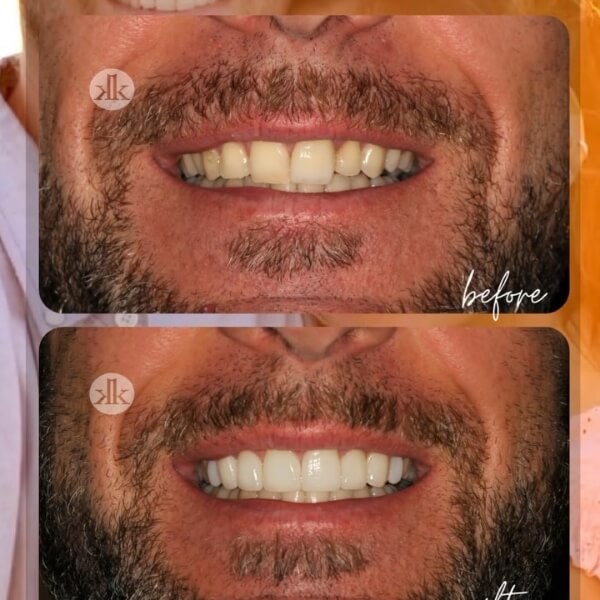
Dental Fillings in San Diego, CA
When plaque and tartar are left on the teeth, it causes a buildup of bacteria. This bacteria penetrates the enamel and deeper layers of the tooth, causing cavities. Fillings are used to remove the bacteria and fill the cavity to protect that area from further damage.
Cavities are easily treated, with fillings taking no more than 30 minutes to complete.
If Dr. Kohani finds a cavity during a routine cleaning and evaluation, he will assess its severity and determine the best way to treat it.
“At our practice, we do not cut corners. We only use the most advanced, cutting-edge equipment available.”rn— Dr. Kohani
How It Works
What Is the Process for Dental Fillings?
Step One
Visit La Jolla Cosmetic Dentistry & Orthodontics for a dental checkup. You can call (858) 295-0603 or use our online contact form to schedule an appointment.
Step Two
Dr. Kohani will examine your teeth and gums to evaluate your oral health and check for tooth decay.
Step Three
If a cavity is detected and small enough to be treated with a dental filling, he can repair the affected tooth using tooth-colored composite resin, sometimes on the same day.
Step Four
When several teeth have cavities, a separate appointment may be required, but when completed, the teeth will be restored and protected.
-
Filling Your Cavity
With a dental cleaning and examination, Dr. Kohani can identify cavities needing treatment. Some teeth may show the beginning signs of a dental cavity but may not require treatment right away.
If you do need a filling, Dr. Kohani will prepare your tooth for the procedure. He will start by numbing the surrounding area and injecting a local anesthetic into the gums. Next, Dr. Kohani will remove the decay and place the bonding agent and composite material into the hole. He will then harden the composite material using a curing light to ensure your filling remains fixed in place.
Due to the anesthetic, you should feel no pain during or after your procedure. You might feel some soreness and sensitivity after the anesthesia wears off; however, any discomfort will only last a few hours.
Dr. Kohani finds that composite dental fillings are suitable for all his patients. There are many benefits associated with composite dental fillings, including their ability to match the color of your existing teeth. Composite, or tooth-colored fillings, are usually made from acrylic and glass in a liquid or malleable solid form and shaded to blend seamlessly with your dentition.
Most patients want to maintain the natural appearance of their smile as much as possible or enhance it to look brighter or straighter. A tooth-colored filling makes it possible for you to improve your oral health without compromising your appearance.
Whereas silver fillings are somewhat conspicuous in the mouth, composite fillings are virtually invisible. The material also contains no mercury and is often perceived as a safer treatment option.
-
Preparing for Dental Fillings
You can prepare for dental fillings by eating a large breakfast, as you may not be able to eat immediately following your dental fillings. It is also important to brush and floss your teeth thoroughly before your treatment.
Testimonials
Our patients LOVE us, and you will too!
Dr. Kohani changed my smile by using his special veneering technique with minimal alteration of my own teeth. He is an absolute perfectionist and does unbelievable work. No one can tell I have veneers; they just notice my bright and shining smile.
I have gone to Dr. Kohani a few times now and have had nothing but great experiences. I was impressed with the friendly staff that is welcoming and organized. We all know these visits aren’t necessarily ones we look forward to, but Dr. Kohani makes this experience quite pleasant…
I was new to La Jolla, out looking for a dentist and I actually walked into Dr. Kohani’s office by mistake. Well, it was one of the best mistakes I made. My teeth needed a ton of work and Dr. Kohani did a beautiful job. I needed fillings, root canals and veneers. Dr. Kohani was able to do it all…
What Can I Expect After My Dental Fillings?
Most dental fillings require a numbing agent that prevents the patient from feeling pain. Some dental fillings may not require a numbing agent if the filling is placed in an area where the nerve is not in contact.
The numbing agents often used in general dentistry are topicals or injections that allow you to remain awake, calm, and responsive to the dentist’s instructions. After completing your dental filling, the area should feel smooth and natural. Dental fillings should not disrupt your bite.
Complications are unlikely to develop after a patient has dental fillings. Some dental filling materials contain metal elements that could be absorbed into the body through the mouth. These elements, such as mercury, zinc, and silver, are proven to be harmful to the body. Luckily, Dr. Kohani only performs dental fillings with a safe, FDA-approved composite material. According to the FDA, composite fillings are the most common alternative to metal dental fillings.
After dental fillings, patients can drive home. A numbing agent is the only pain mitigation required for dental fillings.
How Can I Prevent the Need for Dental Fillings?
Proper oral hygiene and oral maintenance are crucial to preventing the formation of cavities. This means proper brushing and flossing habits at home and routine dental checkups and cleanings. Regular dental cleanings help by removing plaque buildup and oral bacteria that cause decay.
Dental Filling Procedures in San Diego, CA
According to the CDC, almost one-third of adults between the ages of 20 and 44 have untreated dental cavities that would likely require fillings if examined. Other studies suggest that the average American has had at least three dental fillings in their lifetime.
Cavities are common and should not cause concern as long as they are treated early.
Call La Jolla Cosmetic Dentistry & Orthodontics at (858) 295-0603 to get started on stronger, healthier teeth.
Dr. Kohani is an experienced dentist specializing in orthodontics and cosmetic dentistry. La Jolla Cosmetic Dentistry & Orthodontics can treat a number of different general dentistry concerns, including:
We also provide a wide range of cosmetic dentistry treatments and offer sedation dentistry for your comfort and well-being.
You are likely wondering if dental fillings are covered by insurance. Everyone’s dental plan is unique. For an accurate breakdown of your dental coverage, you should discuss your benefit plan with your insurance provider before treatment to determine if (or to what extent) you are covered for dental fillings.
Patient Portal Login













